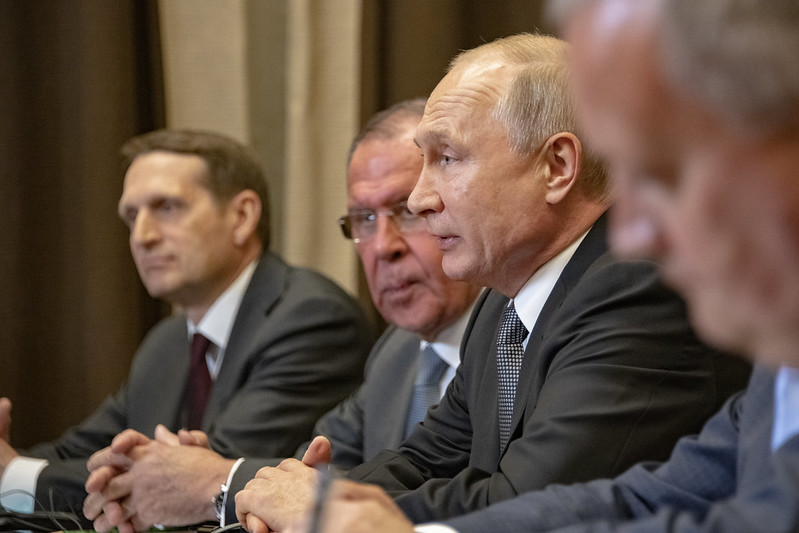
U.S. Secretary of State Michael R. Pompeo meets with Russian President Vladimir Putin in Sochi, Russia on May 14, 2019. [State Department photo by Ron Przysucha/ Public Domain]
In 1968, the American scholar Jerome M. Gilison described Soviet elections as a “psychological curiosity”—a ritualized, performative affirmation of the regime rather than a real vote in any sense of the word. These staged elections with their nearly unanimous official results, Gilison wrote, served to isolate non-conformists and weld the people to their regime.
Last Sunday, Russia completed the circle and returned to Soviet practice. State election officials reported that 87 percent of Russians had cast their vote for Vladimir Putin in national elections, giving the Russian president a fifth term in office. Not only were many of the reported election numbers mathematically impossible, but there was also no longer much of a choice: All prominent opposition figures had been either murdered, imprisoned, or exiled. Like in Soviet times, the election also welded Russians to their regime by serving as a referendum on Putin’s war against Ukraine. All in all, last weekend’s Soviet-style election sealed Putin’s transformation of post-Communist Russia into a repressive society with many of the features of Soviet totalitarianism.
Russia’s return to Soviet practice goes far beyond elections. A recent study by exiled Russian journalists from Proekt Media used data to determine that Russia is more politically repressive today than the Soviet Union under all leaders since Joseph Stalin. During the last six years, the study reports, the Putin regime has indicted 5,613 Russians on explicitly political charges—including “discrediting the army,” “disseminating misinformation,” “justification of terrorism,” and other purported crimes, which have been widely used to punish criticism of Russia’s war on Ukraine and justification of Ukraine’s defense of its territory. This number is significantly greater than in any other six-year period of Soviet rule after 1956—all the more glaring given that Russia’s population is only half that of the Soviet Union before its collapse.
In addition to repressive criminal charges and sentences, over the last six years more than 105,000 people have been tried on administrative charges, which carry heavy fines and compulsory labor for up to 30 days without appeal. Many of these individuals were punished for taking part in unsanctioned marches or political activity, including anti-war protests. Others were charged with violations of COVID pandemic regulations. Such administrative punishments are administered and implemented rapidly, without time for an appeal.
On March 4, 2022, a little over a week after the Russian invasion of Ukraine began, Russia’s puppet parliament rapidly adopted amendments to the Russian Criminal Code and Criminal Procedure Code that established criminal and administrative punishments for the vague transgressions of “discrediting” the Russian military or disseminating “false information” about it. This widely expanded the repressive powers of the state to criminally prosecute political beliefs and activity. Prosecutions have surged since the new laws were passed, likely leading to a dramatic increase in the number of political prisoners in the coming years. In particular, punishments for “discrediting the army” or “justification of terrorism”—which includes voicing support for Ukraine’s right to defend itself—have resulted in hundreds of sentences meted out each year since the war began. The most recent such case: On Feb. 27, the 70-year-old co-chairman of the Nobel Peace Prize-winning human rights group Memorial, Oleg Orlov, was sentenced to two and a half years in prison for “discrediting” the Russian military.
As the Proekt report ominously concludes, “[I]n terms of repression, Putin has long ago surpassed almost all Soviet general secretaries, except for one—Joseph Stalin.” While this conclusion is in itself significant, it is only the tip of the iceberg of the totalitarian state Putin has gradually and systematically rebuilt.
Read more here.
If you’re willing to fight for Main Street America, click here to sign up for my free weekly email.




